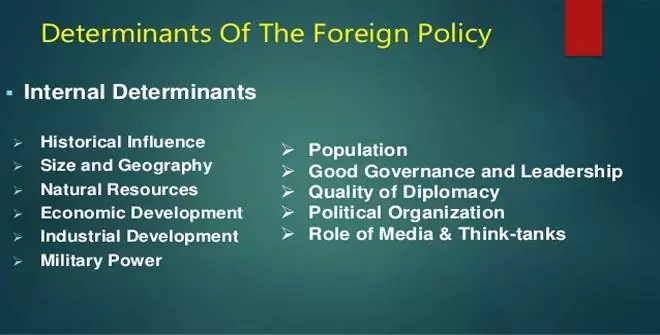Determinants of India’s Foreign Policy
India’s foreign policy has evolved since independence in 1947. It reflects a complex interplay of historical, geopolitical, economic, and ideological factors which served as Determinants of India’s Foreign Policy.
Historical Context
India’s foreign policy is deeply rooted in its historical experiences. The colonial legacy has left a lasting impact on its diplomatic strategies.
Colonial Legacy
The British colonial rule instilled a sense of mistrust towards external powers. Post-independence, India sought to assert its sovereignty and avoid alignment with superpowers. This historical context laid the groundwork for a non-aligned approach.
Non-Alignment Movement (NAM)
India was a founding member of the NAM, which emphasised independence from superpower blocs. This movement aimed to create a third path during the Cold War, promoting peace and cooperation among nations.
Geopolitical Factors
Geopolitical considerations play important role in shaping India’s foreign policy.
Geographical Location
India’s strategic location near major powers like China and Pakistan influences its diplomatic engagements. The Indian Ocean’s proximity is also for trade and security.
Regional Security Concerns
Border disputes with China and Pakistan are central to India’s security strategy. Additionally, issues of terrorism and insurgency require robust responses and international cooperation.
Economic Factors
Economic considerations are very important in determining foreign policy direction.
Economic Growth
Since liberalisation in 1991, India has focused on strengthening trade relations. Economic partnerships are now integral to its foreign policy.
Energy Security
India’s growing energy demands necessitate engagement with resource-rich countries in the Middle East and Central Asia. Energy security is a priority in diplomatic discussions.
Domestic Political Factors
Domestic politics influence foreign policy decisions.
Political Leadership
The vision of political leaders shapes foreign policy. Leaders like Nehru, Indira Gandhi, and Modi have left distinct marks on India’s international relations.
Public Opinion
Nationalism and public sentiment often guide foreign policy. Leaders must navigate public expectations while formulating international strategies.
Strategic Interests
India’s foreign policy is driven by strategic interests focused on security and influence.
National Security
Defence policies and military modernisation are crucial for national security. Strategic alliances, such as the Quadrilateral Security Dialogue (Quad), enhance India’s position in global affairs.
Soft Power
India utilises soft power through cultural diplomacy. Promoting Indian culture and engaging the diaspora strengthens its global image.
International Relations
Bilateral and multilateral engagements are vital for India’s foreign policy.
Bilateral Relations
India maintains key partnerships with countries like the USA, Russia, Japan, and ASEAN nations. These relationships are essential for trade, security, and technology transfer.
Multilateral Engagement
India actively participates in international organisations such as the UN, BRICS, and G20. These platforms allow India to voice its concerns and influence global governance.
Technological Factors
Technological advancements shape India’s defence and cybersecurity strategies.
Defense Technology
India focuses on indigenous defence production. Collaborations for technology transfer enhance its military capabilities.
Cybersecurity
With the rise of digital threats, cybersecurity has become a key aspect of foreign policy. India seeks international cooperation to address these challenges.
Environmental Factors
Environmental issues increasingly influence India’s foreign policy.
Climate Change
India is committed to global climate agreements, such as the Paris Agreement. It aims to balance development and environmental sustainability.
Water Security
Transboundary river management is crucial for regional stability. Water-sharing agreements with neighbouring countries are essential for diplomacy.
Ideological Factors
India’s secular and pluralistic identity shapes its foreign relations.
Secularism and Pluralism
India’s commitment to secularism influences its approach to international issues. It advocates for peaceful coexistence and mutual respect among nations.
Global Governance
India calls for reforms in global institutions to reflect contemporary realities. This advocacy aligns with its aspirations for a greater role in international decision-making.
Global Trends
Emerging global trends impact India’s foreign policy decisions.
Rise of China
India’s strategic responses to China’s growing influence are crucial. Balancing relations with China while asserting its own interests is a diplomatic challenge.
US-China Rivalry
India navigates the complexities of US-China rivalry. Strengthening ties with the US while managing relations with China is essential for regional stability.
Regional Dynamics
India’s relationships with its neighbours are very important in its foreign policy framework.
South Asia
India maintains relations with neighbouring countries like Bangladesh, Nepal, Sri Lanka, and Bhutan. These relationships are vital for regional cooperation and security.
Indian Ocean Region
Maritime security in the Indian Ocean is crucial for India’s strategic interests. India seeks to enhance its influence in this vital region.
Non-State Actors
Non-state actors affect India’s foreign policy landscape.
Terrorism
The threat of terrorism, especially from non-state actors in Pakistan, influences India’s security policies. Counter-terrorism cooperation is a priority in international relations.
Diaspora Influence
The Indian diaspora plays important role in shaping perceptions abroad. Their contributions to foreign policy discussions enhance India’s global standing.



